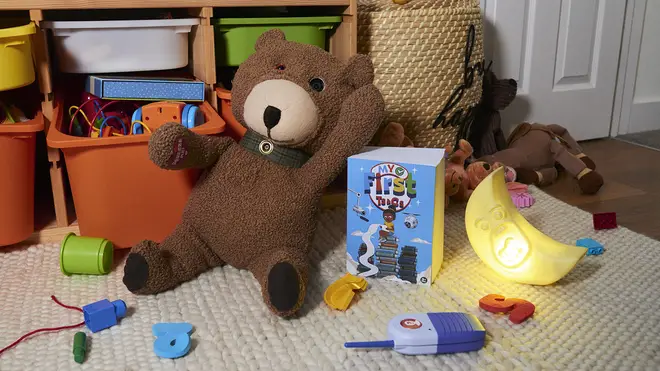
James O'Brien 10am - 1pm
23 June 2021, 05:04

Twisted Toys have been created to show the digital dangers children face online, and how the same threats would not be tolerated offline.
A collection of mock toys which mimic online abuse have been unveiled by a children’s rights group to highlight how certain behaviours permitted online would never be tolerated in the real world.
Campaign group 5Rights has launched “Twisted Toys”, including a Share Bear which gathers and shares a child’s data and a Pocket Troll which scrutinises every moment of a child’s day and bombards them with unkind comments.
The group says the aim of the campaign is to help parents understand the dangers children can be exposed to online, and has been launched alongside new research from 5Rights which found that 80% of parents do not trust tech companies to protect children online, and 71% think the Government should be doing more around online safety.
The toy range also includes a storybook of terms and conditions that would take hundreds of hours to read and a “stalkie talkie” which allows strangers to interact with children.
The Government unveiled the proposed Online Safety Bill earlier this year, which will introduce a new duty of care for online platforms and place them within the scope of Ofcom in its new role as an online regulator.
But 5Rights chair Baroness Beeban Kidron said parents still want more to be done.
“Too often, people forget that digital products and services are consumer goods – and as such they need to be safe for those who use them – especially children,” she said.
“We don’t share personal information about children with random strangers, we don’t allow strangers to knock on the door and ask for a naked Polaroid, we don’t allow people to assess their emotional state to sell them something. But all of this takes place online every day.
“Simply put, we do not accept this in the real world, and we must not allow it in the digital world.
“Twisted Toys shows just how dangerous and inappropriate data surveillance is; that terms and conditions are not fit for purpose; and that the tech sector is failing to offer even the most basic safety requirements. Parents want change.”
According to 5Rights’ research, 90% of parents surveyed think the internet can be harmful to children.
The campaign has been backed by a number of online safety campaigners, including Ian Russell, whose daughter Molly took her own life in 2017 after viewing self-harm and suicide content on social media.
Mr Russell, who has since created the Molly Rose foundation in his daughter’s memory, said that while the mock toys “might seem to be a disturbing vision of a warped future”, they in fact “reveal the digital danger our children face every day, right now”.
He added: “Since the death of my youngest daughter in 2017, I have looked into the depths of these perils and felt the disturbing effect they produce.
“Safely designed tech platforms can be a great benefit to our children, but as long as profit continues to be prioritised, distress will be spread digitally, and young lives will be ruined and lost.
“Twisted Toys sends a clear message and raises awareness about harms too easily found online, harms that can adversely affect our mental wellbeing.
“This 5Rights campaign will save lives, it stimulates reaction and clearly shows effective regulation is long overdue to stop the misery and anguish the tech platforms can cause.”
It has also received backing from Lord Vaizey, the former minister for culture, communications and creative industries, who said it “really brings to life the way tech platforms track and monitor our kids”.
“While tech is different, we can’t just chuck away societal norms, and Twisted Toys cleverly emphasises the kinds of things we now seem to accept as normal which are actually completely unacceptable,” he said.